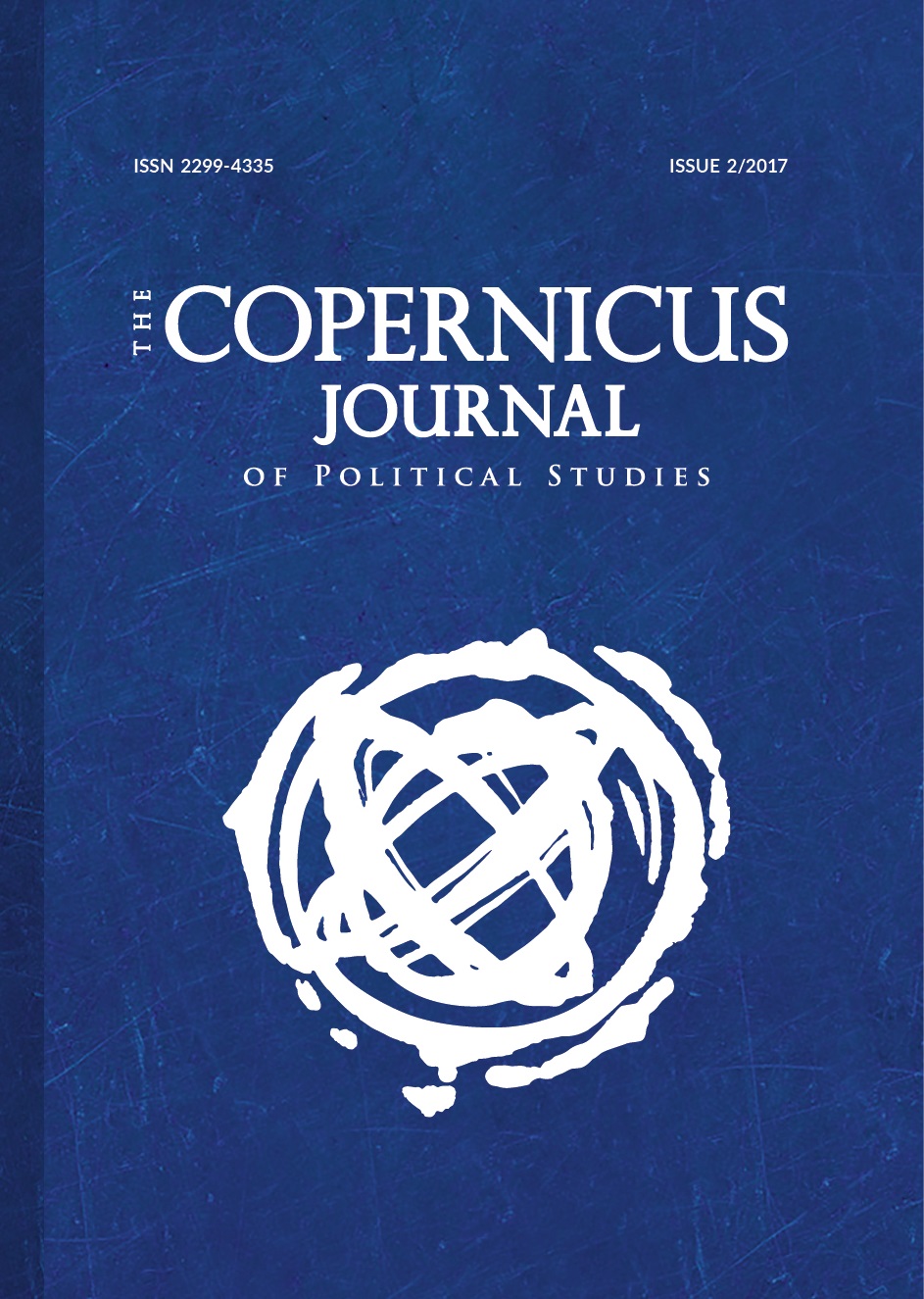THE FOREIGN POLICY OF THE UNITED STATES: LEADING POWER?
DOI:
https://doi.org/10.12775/CJPS.2017.011Słowa kluczowe
Obama, U.S. history, Syria, Russia, China, Israel, U.S. institutionsAbstrakt
The United States, with its historical background of exceptionalism, rose to power in the twentieth century and has maintained it until today. If it were not for the state’s economic power and its strong institutions within the three branches of government, the U.S. would not be now a dominant global power and a regional hegemonic leader. Thus, even when faced with the lack of leadership, the state is able to retain its dominance in the international arena. Supported with a short review of U.S. history, this article presents the state’s (in)activism in global politics during Obama’s presidency.
Bibliografia
Adelman, J. (2013). Why The U.S. Remains The World's Unchallenged Superpower. Forbes. Retrieved on May 20, 2014 from https://www.forbes.com/sites/realspin/2013/11/24/why-the-u-s-remains-the-worlds-unchallenged-superpower/#691396b55b6e
Albright, M. K. (2003). United Nations. Foreign Policy 138, 16-18,20,22,24.
Asghar, R. (2013). The Myth of America's Decline: Why the U.S. Won't Lose the Globalization Game [Kindle edition]. Retrieved from www.amazon.com
Bew, J. (2014). The Real Origins of Realpolitik. The National Interest 130[Kindle edition]. Retrieved from www.amazon.com
Cliffnotes. (2014). The United States as a World Power. Houghon Mifflin Harcourt. Retrieved on April 7, 2015 from http://goo.gl/X8sKxB
Etzioni, A. (2004). From empire to community. A new approach to international relations. New York: Palgrave Macmillan.
Folsom Jr., B. & Folsom, A. (2010, April 12). Did FDR End the Depression? The Wall Street Journal. Retrieved on April 13, 2015 from http://goo.gl/IaZc6P
Friedman, G. (2013). Beyond the Post-Cold War World. Stratfor. Retrieved on April 12, 2015 from http://goo.gl/uhgW0G
Green, M. J. & and Cooper, Z. (2014). Revitalizing the Rebalance: How to Keep U.S. Focus on Asia, The Washington Quarterly 37(3), 25-46.
Hall, K. (2014). Sovereign Duty [Kindle edition]. CreateSpace Independent Publishing Platform. Retrieved from www.amazon.com
Hambleton, C. (2014). Who are Americans? (Our American Awakening Book 2) [Kindle edition]. Retrieved from www.amazon.com
Hirsh, M. (2004). Cited in A. Etzioni, From empire to community. A new approach to international relations. New York: Palgrave Macmillan.
Lind, M. (2014, July 12). The American Century is over: How our country went down in a blaze of shame. Salon. Retrieved on 13 April 2015 from https://www.salon.com/2014/07/12/the_american_century_is_over_how_our_country_went_down_in_a_blaze_of_shame/
Joffe, J. (2013). The Myth of America's Decline: Politics, Economics, and a Half Century of False Prophecies [Kindle edition]. Liveright. Retrieved from www.amazoncom
Lizza, R. (2011, April 26). Leading from behind. The New Yorker. Retrieved on Aprl 11, 2015 from http://goo.gl/wl5tkA
Mearsheimer, J. (2014). Why the Ukraine Crisis Is the West’s Fault. The Liberal Delusions That Provoked Putin. Foreign Affairs 93 (5), 1-12.
Mearsheimer, J. J. (2013). Taiwan’s Dire Straits The National Interest 130, pp. 29-39. ,
Morse, C. (2013). American Testament - The Declaration of Independence and the U.S. Constitution: keys to America’s future [Kindle edition]. City Metro Enterprises. Retrieved from www.amazon.com
Newell, J. (2014). U.S. Foreign Policy Study Guide: An In-Depth Analysis of U.S. Foreign Policy, [Kindle edition]. Athena LLC. Retrieved from www.amazon.com
Nye, Jr, J. S. (2015). Is the American Century Over?[Kindle edition]. Polity. Retrieved from: www.amazon.com
Rogers, E. (2015, February 23). The Insiders: Why would anyone think Obama doesn’t love America? Plenty of reasons. The Washington Post. Retrieved on February 23, 2015 from http://www.wapo.st/1zaPuE9
Tertrais, B. (2014). Drawing Red Lines Right. The Washington Quarterly 37(3), 7-24.
US Department of State. (n.d.). A Short History of the Department of State, Retrieved on April 7, 2015 from http://goo.gl/9yH5on
Waltz, K. (2000). Structural Realism after the Cold War. International Security 25(1), 5-41.
The White House. (2015). The Executive Branch. Retrieved on January 18, 2015 from http://goo.gl/aJTvV
Pobrania
Opublikowane
Jak cytować
Numer
Dział
Statystyki
Liczba wyświetleń i pobrań: 717
Liczba cytowań: 0



